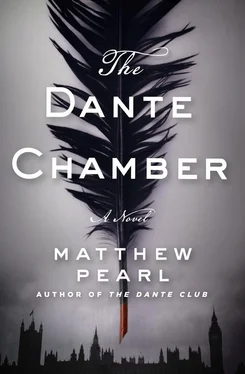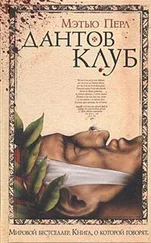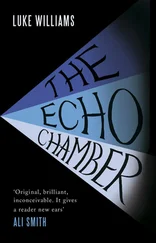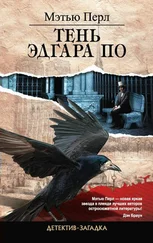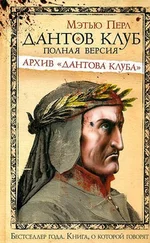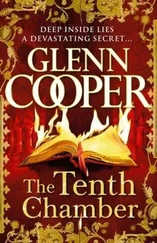Dolly’s private office was not very different than the others at Scotland Yard. Except for two things. First, there was the number and varied selection of books on the shelves. Second were the plaster casts of heads along the wall, with ropes hanging alongside some of them.
Even in the midst of a crisis, other police affairs would find a way to invade Dolly’s time. There were the silk curtains stolen from Windsor Castle that showed up at an auction house. There was the latest band of conspirators fighting for Irish freedom — over the years the diverse revolutionaries had come to be known as Fenians — arrested in a trap sprung by two of Dolly’s detectives, Thornton and Clarke. Even though the Fenians’ threats produced far less actual violence than garden-variety blackguards, the public feared them out of all proportion. But at the moment, Dolly couldn’t take his eye off the case that he felt growing more perilous — and peculiar — every day.
“Well, Branagan,” Dolly said, “there go our poets. What did you think of them?”
“They certainly seem to know Mr. Rossetti is in some kind of trouble and to have no better idea than we do of where he is.”
“I said they would come here sooner rather than later, didn’t I?” Dolly boasted with a grin that landed heavily on one side, like his hat. He had a fondness for being correct, a trait that suited this career. “Notice the younger Rossetti brother, William, wasn’t with them.”
“Inspector Williamson, why not tell Miss Rossetti what we know so far about her brother?”
“Branagan, a person will always be inclined to reveal more by asking questions than they will answering them.”
“I am sure you are right, Inspector. However, now we’ve heard what they have to say about Mr. Rossetti. What harm could it do to share some of our information, to tell them, at least, about the sighting of Mr. Rossetti at the scene of the crime?”
Dolly thought about the suggestion before exiling it with a sigh. “Branagan, did you look into the eyes of that lady? Miss Rossetti has the eyes of faith. If she knew our suspicions... well, she’d tell us nothing.”
“But what will she tell us now that we’ve dismissed her? It’s doubtful she’ll ever come back here at all.”
“Now that she will presume we are uninterested in the issue of Mr. Rossetti, she and Mr. Browning will be more determined to do something about all this themselves. Especially when they read the Ledger and come across the information I gave Walker to write about. Mark what I say. Miss Rossetti and Mr. Browning could provide us revelations that, if they knew we are paying attention, they would not. For the moment, we continue to watch.”
Dolly had already searched Tudor House and ordered Branagan to continue to shadow the movements of Christina, her brother William, and Browning. The detective was not intimidated by the celebrity of the visitors, nor the literary and artistic reputation of the missing Dante Gabriel Rossetti. Ever since he had handled a case that required him to trace the author and publisher of an anonymous book advocating the assassination of the French king, the commissioner selected Dolly for any matters related to books, authors, and artists. Even written and painted forgeries came to Dolly’s desk. Dolly considered it an advantage that he did not look as though he read the enormous number of books that he did. He seemed wonderfully average.
It was the burden of the literary man or woman of a city such as London to feel themselves superior to the herds of common people. But Dolly felt confident that, if necessary, he’d outwit any ordinary genius. This case, in all events, had little room for error. With the murder of a member of Parliament, and the widow Morton assembling more public memorials than received by the ancient pharaohs, the Home Office roasted on hot coals.
A week and a half later, Dolly was searching through another box of materials Branagan brought to him. The constable had urged Dolly not to take more than an hour, when he would have to bring them back before they would be missed. It was fortunate, Branagan said, that none of the sinister animals of Tudor House had attacked him yet.
“Branagan.” Dolly called him back to him after examining the spoils. “You’ve done decent work. Get your things together. We have a scenic ride ahead of us. We are on to our best witness yet.”
“Truly? Who is it, Inspector?”
“Dante Alighieri.”
Robert Browning lagged behind Christina as they made their way up two long flights of stairs leading to Arthur Hughes’s studio. The poet was impressed by how swiftly his companion, so much sturdier than she appeared, scaled the creaking treads in her restrictive skirts and heavy boots — or maybe he chose to believe she was quick moving rather than think his own fifty-seven years were finally slowing him down. Though he was average height, Browning prided himself on his physical strength, particularly in his shoulders and legs. Despite Christina’s reputation for reclusiveness, she exhibited none of the hesitation Browning himself felt in entering these chambers, which emitted obscene shouts and the strong odors of cheap perfumes and cheaper tobacco.
How odd it had been at the Wapping gardens seeing her surrounded by society’s discarded outcasts, while Christina herself was such a — well, what was Christina? She wore colors that were too dark and skirts that did not extend to her boots as was standard. She had been a beautiful if pale girl who avoided marriage. She was an astoundingly original poet who swatted away fame. Browning couldn’t help but think of first meeting his Elizabeth when she was held in seclusion by her father. But Ba could not wait to be part of life, of politics, of movements. Christina cultivated her seclusion. With her complexion and the vaguely foreign rhythms of her speech, she really seemed to be taken out of one world and put into theirs.
Generally speaking, Browning wasn’t shy about being out in society. He had appreciated hearing secondhand one acquaintance’s comment: “I like Browning — he isn’t at all like a damned literary man.” He frequented dinners and concerts and plays. One magazine writer had even named him the poet most accessible to the common public in the history of England except for Chaucer. Browning, unlike Tennyson, hadn’t gone to Oxford or Cambridge, cut off from such opportunity because his family had been dissenters from the Anglican Church; he started then abandoned London University, finding it useless. Still, the fact was that over the last years he felt himself become more accustomed, even reliant, on being around the wealthiest classes of London society. Especially as his poetry’s popularity expanded.
Ba would have challenged it all. Of course you seek company in white tie, Robert — she might have reprimanded him — because it will always be easier to make people like you in the dappled lights of chandeliers than through your poetry, which you would consider a failure if it didn’t push away as many people as it invites in.
“Aren’t you coming, Mr. Browning?” Christina asked.
As Christina’s gaze fixed on him, he realized she was the age Ba had been when he’d first met her. At least, he believed so. Ba, sensitive about being older than her husband, had been coy about revealing her exact age.
His legs had stopped and he was standing lost in his thoughts. “Apologies, Miss Rossetti.”
At the top of the stairs, they entered into a labyrinth of easels, half-complete sculptures, and stacks of papers and canvases, along with an assortment of artists and their models. Hughes, a beardless man with a meticulously combed mustache and luminescent skin, seemed to be about to attack his canvas with his brush, though he withdrew his hand before committing paint to it. A young woman in a long, silky green dress stretched herself over a sofa in front of him.
Читать дальше
